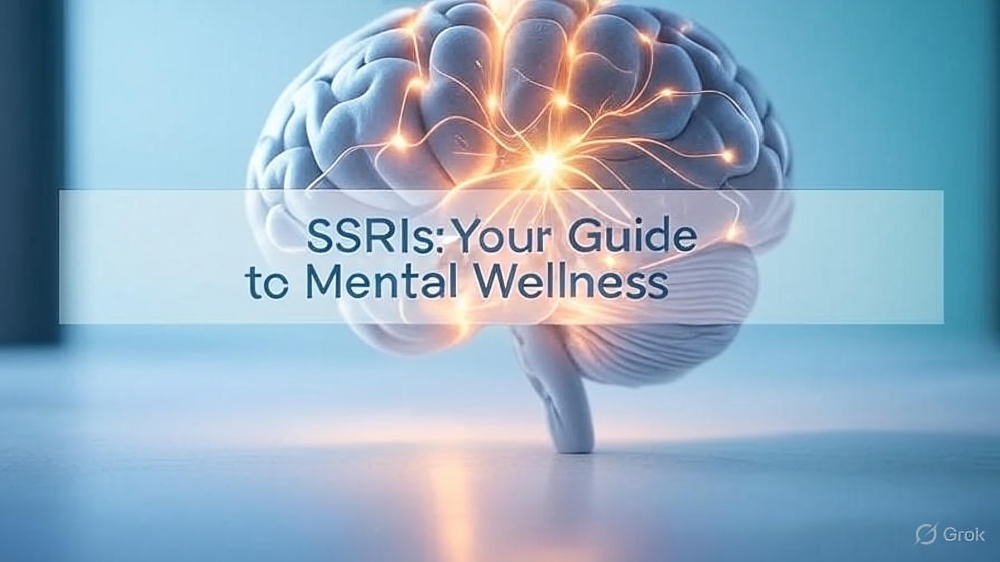Selective serotonin reuptake inhibitors (SSRIs) represent one of the most significant advances in modern mental health treatment. As the most commonly prescribed class of antidepressants worldwide, SSRIs have helped millions of people manage depression, anxiety, and other mental health conditions effectively. This comprehensive guide explores everything you need to know about SSRIs, from their mechanism of action to practical considerations for safe and effective use.
What Are SSRIs?
Selective serotonin reuptake inhibitors are a class of psychiatric medications specifically designed to treat various mental health conditions by targeting the brain’s serotonin system. Unlike older antidepressants that affect multiple neurotransmitter systems, SSRIs work selectively on serotonin, which is why they’re called “selective.”
SSRIs are considered first-line treatments for depression and anxiety disorders due to their effectiveness and relatively favorable side effect profile compared to older antidepressant classes like tricyclics and monoamine oxidase inhibitors (MAOIs).
Key Characteristics of SSRIs:
- Selective action: Target only serotonin reuptake mechanisms
- FDA-approved: Rigorously tested for safety and efficacy
- Widely prescribed: Most commonly used antidepressant class globally
- Versatile: Effective for multiple mental health conditions
How SSRIs Work: The Science Behind Serotonin
Understanding how SSRIs work requires a basic knowledge of brain chemistry and neurotransmitter function. Serotonin, often called the “feel-good” neurotransmitter, plays a crucial role in regulating mood, sleep, appetite, and overall emotional well-being.
The Serotonin System
In a healthy brain, nerve cells (neurons) communicate by releasing neurotransmitters like serotonin into the spaces between cells (synapses). After serotonin delivers its message, it’s typically reabsorbed (reuptaken) by the sending neuron through special proteins called serotonin transporters.
SSRI Mechanism of Action
SSRIs work by blocking these serotonin transporters, preventing the reuptake of serotonin. This blockade results in:
- Increased serotonin availability in brain synapses
- Enhanced serotonin signaling between neurons
- Improved mood regulation over time
- Better emotional stability and reduced anxiety
The process isn’t immediate – it typically takes 4-8 weeks for the full therapeutic effects to develop as the brain adapts to increased serotonin levels.
FDA-Approved SSRIs: Types and Characteristics
The FDA has approved seven main SSRIs for use in the United States, each with unique characteristics and approved indications:
Citalopram (Celexa)
- Approved for: Major depressive disorder
- Key features: Generally well-tolerated, fewer drug interactions
- Typical dosage: 20-40mg daily
Escitalopram (Lexapro)
- Approved for: Depression and generalized anxiety disorder
- Key features: Often considered highly effective with fewer side effects
- Typical dosage: 10-20mg daily
Fluoxetine (Prozac)
- Approved for: Depression, OCD, panic disorder, bulimia nervosa
- Key features: Longest half-life, available in weekly formulation
- Typical dosage: 20-80mg daily
Paroxetine (Paxil)
- Approved for: Depression, anxiety disorders, PTSD, OCD
- Key features: Sedating effects, higher discontinuation syndrome risk
- Typical dosage: 20-50mg daily
Sertraline (Zoloft)
- Approved for: Depression, anxiety disorders, OCD, PTSD, panic disorder
- Key features: Broad spectrum of approved uses, activating effects
- Typical dosage: 50-200mg daily
Fluvoxamine (Luvox)
- Approved for: OCD, social anxiety disorder
- Key features: Primarily used for OCD, significant drug interactions
- Typical dosage: 100-300mg daily
Vilazodone (Viibryd)
- Approved for: Major depressive disorder
- Key features: Newer SSRI with additional serotonin receptor activity
- Typical dosage: 20-40mg daily
Treatment Applications: What Conditions Do SSRIs Treat?
SSRIs are FDA-approved for treating various mental health conditions, making them versatile tools in psychiatric care:
Primary Indications:
- Major Depressive Disorder: Most common use, highly effective
- Generalized Anxiety Disorder: Reduces excessive worry and anxiety
- Panic Disorder: Prevents panic attacks and reduces anticipatory anxiety
- Social Anxiety Disorder: Helps with social phobia and performance anxiety
- Obsessive-Compulsive Disorder: Reduces intrusive thoughts and compulsive behaviors
- Post-Traumatic Stress Disorder: Helps process trauma and reduce symptoms
Off-Label Uses:
- Premenstrual dysphoric disorder (PMDD)
- Premature ejaculation
- Hot flashes in menopause
- Chronic pain conditions
- Eating disorders
Understanding SSRI Side Effects
While SSRIs are generally well-tolerated, understanding potential side effects is crucial for informed treatment decisions.
Common Side Effects (Affecting 10-30% of patients):
- Gastrointestinal: Nausea, diarrhea, constipation, stomach upset
- Sexual: Decreased libido, delayed orgasm, erectile dysfunction
- Neurological: Headaches, dizziness, drowsiness or insomnia
- Physical: Dry mouth, sweating, weight changes, fatigue
Serious but Rare Side Effects:
- Serotonin Syndrome: Life-threatening condition from excessive serotonin
- Suicidal Thoughts: Increased risk in patients under 25, especially initially
- Bleeding Risk: Increased bleeding tendency, especially with blood thinners
- Hyponatremia: Low sodium levels, particularly in elderly patients
Managing Side Effects:
- Start with lowest effective dose
- Take with food to reduce nausea
- Maintain consistent timing
- Report concerning symptoms to healthcare provider immediately
Safety Considerations and Warnings
Black Box Warning: Suicide Risk
The FDA requires all antidepressants to carry a black box warning about increased suicide risk in children, adolescents, and young adults under 25. This risk is highest during the first few months of treatment or when doses are changed.
Drug Interactions
SSRIs can interact with numerous medications, including:
- MAOIs: Potentially fatal serotonin syndrome
- Blood thinners: Increased bleeding risk
- Other serotonin-affecting drugs: Risk of serotonin syndrome
- Certain pain medications: Enhanced effects
Special Populations
Pregnancy and Breastfeeding
- Some SSRIs are safer during pregnancy than others
- Sertraline and citalopram often preferred during breastfeeding
- Always consult healthcare provider before making changes
Elderly Patients
- Start with lower doses
- Monitor for hyponatremia and falls
- Consider drug interactions with other medications
Treatment Timeline: What to Expect
Understanding the SSRI treatment timeline helps set realistic expectations:
Week 1-2:
- Side effects may appear before benefits
- Some patients notice slight mood improvements
- Sleep and appetite may begin to normalize
Week 4-6:
- Mood improvements become more noticeable
- Energy levels typically improve
- Side effects often diminish
Week 8-12:
- Full therapeutic effects usually achieved
- Optimal dosing may be established
- Long-term treatment plan developed
Personalized Medicine and Genetic Testing
Modern psychiatry increasingly recognizes that SSRI response varies significantly between individuals. Pharmacogenetic testing can help predict:
- Medication metabolism: How quickly you process specific SSRIs
- Side effect risk: Genetic predisposition to certain adverse effects
- Efficacy prediction: Likelihood of response to specific medications
This emerging field offers hope for more personalized, effective treatment approaches.
Lifestyle Integration and Optimization
Maximizing SSRI effectiveness involves more than just taking medication:
Complementary Strategies:
- Regular exercise: Enhances serotonin production naturally
- Consistent sleep schedule: Supports medication effectiveness
- Stress management: Meditation, yoga, or therapy
- Healthy diet: Supports overall brain health
- Social support: Maintains connections and reduces isolation
Avoiding Interactions:
- Limit alcohol consumption
- Avoid recreational drugs
- Be cautious with herbal supplements
- Maintain open communication with all healthcare providers
Discontinuation and Withdrawal Management
Stopping SSRIs requires careful planning to avoid discontinuation syndrome:
Proper Tapering:
- Gradual dose reduction over weeks or months
- Medical supervision essential
- Individual tapering schedules based on specific SSRI
- Monitor for withdrawal symptoms
Withdrawal Symptoms:
- “Brain zaps” or electric shock sensations
- Dizziness and balance problems
- Flu-like symptoms
- Mood changes and irritability
Long-Term Considerations and Maintenance
Many patients benefit from long-term SSRI treatment:
Maintenance Therapy Benefits:
- Prevents depression relapse
- Maintains anxiety control
- Supports long-term mental health stability
- Allows for life quality improvements
Monitoring Requirements:
- Regular psychiatric follow-ups
- Periodic medication reviews
- Side effect assessments
- Dosage adjustments as needed
Making Informed Treatment Decisions
Choosing the right SSRI involves considering multiple factors:
- Specific symptoms and diagnosis
- Previous medication responses
- Potential side effects and tolerability
- Drug interactions and medical history
- Lifestyle factors and preferences
- Cost and insurance coverage
Conclusion: Empowering Your Mental Health Journey
SSRIs represent a powerful tool in modern mental health treatment, offering hope and healing for millions of people worldwide. While they’re not a cure-all, when used appropriately under medical supervision, SSRIs can significantly improve quality of life for those struggling with depression, anxiety, and related conditions.
The key to successful SSRI treatment lies in patience, open communication with healthcare providers, and a comprehensive approach that includes lifestyle modifications and ongoing support. Remember that finding the right medication and dosage often takes time, and what works for one person may not work for another.
If you’re considering SSRI treatment or currently taking these medications, maintain regular contact with your healthcare provider, report any concerning symptoms promptly, and never make changes to your medication regimen without professional guidance.
Take Action: If you’re struggling with symptoms of depression or anxiety, reach out to a qualified mental health professional to discuss whether SSRIs might be appropriate for your situation. Your mental health matters, and effective treatment options are available.
Frequently Asked Questions
Q: How long do I need to take SSRIs?
A: Treatment duration varies by individual and condition. Many people benefit from 6-12 months of treatment for a first episode of depression, while others may need longer-term maintenance therapy. Your healthcare provider will help determine the appropriate duration based on your specific situation.
Q: Can I drink alcohol while taking SSRIs?
A: While not strictly prohibited, alcohol can worsen depression and anxiety symptoms and may increase certain side effects. It’s best to limit alcohol consumption and discuss your drinking habits with your healthcare provider.
Q: Will SSRIs change my personality?
A: SSRIs don’t change your fundamental personality. Instead, they help restore your natural emotional balance by treating symptoms of depression or anxiety that may have been masking your true self.
Q: What should I do if I miss a dose?
A: If you miss a dose, take it as soon as you remember unless it’s close to your next scheduled dose. Never double up on doses. If you frequently forget doses, consider using a pill organizer or setting phone reminders.
Q: Are generic SSRIs as effective as brand names?
A: Yes, generic SSRIs contain the same active ingredients as brand-name versions and are required by the FDA to demonstrate equivalent effectiveness. They’re often more affordable and equally effective options.



